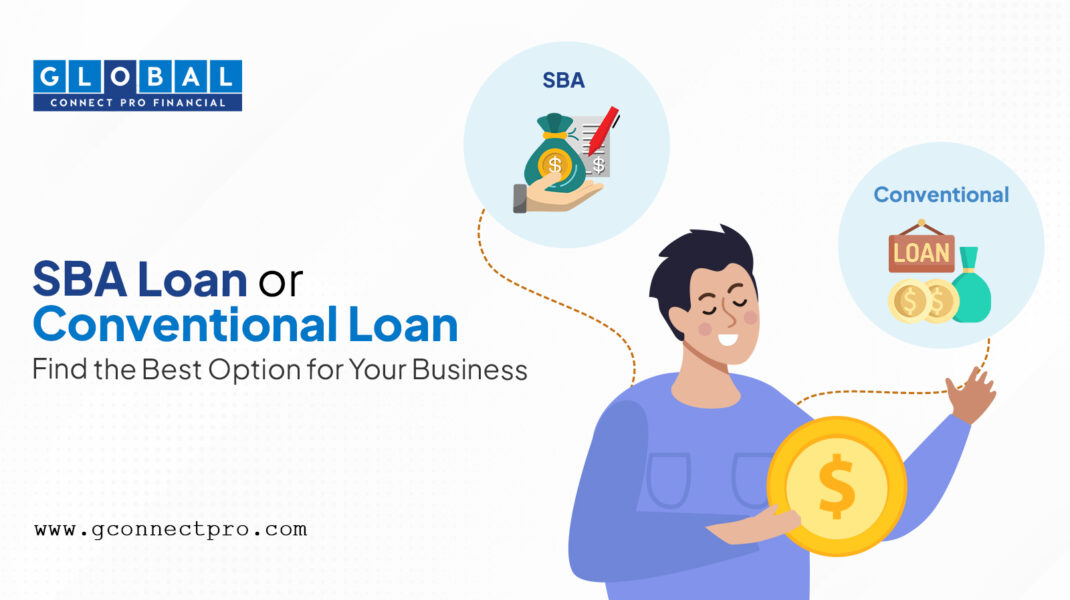SBA Loan or Conventional Loan: Which Will Benefit Your Business More?

When it comes to financing your business, choosing the right loan can be a game-changer. Two popular options are Small Business Administration (SBA) loans and conventional loans. But how do you decide which is best for your business? This guide compares the two options in simple terms, so you can make an informed decision.
What Is an SBA Loan?
An SBA loan is a government-backed loan designed to help small businesses secure funding with favorable terms. The SBA doesn’t lend money directly; instead, it works with approved lenders, such as banks and credit unions, to offer loans with lower risks for both the lender and borrower.
Key Features of SBA Loans:
- Government Guarantee: The SBA guarantees a portion of the loan, reducing the lender’s risk.
- Lower Down Payments: SBA loans typically require smaller down payments compared to conventional loans.
- Longer Repayment Terms: You get more time to repay the loan, making monthly payments more affordable.
- Flexible Use of Funds: These loans can be used for various purposes, including working capital, equipment purchases, or real estate.
What Is a Conventional Loan?
A conventional loan is a loan issued by a bank, credit union, or other financial institution without government backing. These loans are typically offered to businesses with strong credit histories and stable financials.
Key Features of Conventional Loans:
- No Government Involvement: The lender assumes all the risk, which may lead to stricter eligibility criteria.
- Faster Approval Process: Conventional loans often have fewer steps, so you might receive funds more quickly.
- Shorter Repayment Terms: These loans generally come with shorter terms, meaning higher monthly payments.
- Varied Use of Funds: Like SBA loans, conventional loans can be used for many purposes, though restrictions may apply.
Comparing SBA and Conventional Loans
Here’s a side-by-side look at the main differences:
| Feature | SBA Loan | Conventional Loan |
| Eligibility | Easier for small businesses with limited credit history. | Requires strong credit and stable financials. |
| Interest Rates | Lower, thanks to government backing. | Often higher, depending on credit score. |
| Down Payment | As low as 10%. | Typically 20%-30%. |
| Repayment Term | Up to 25 years for real estate loans. | Generally 5-10 years. |
| Processing Time | Longer due to SBA requirements. | Faster, with fewer steps involved. |
| Loan Size | Up to $5 million in many cases. | Depends on lender; can be smaller or larger. |
Pros and Cons of SBA Loans
Pros:
- Lower Interest Rates: Makes repayment more affordable.
- Longer Terms: Reduces the financial burden of monthly payments.
- Accessible to Newer Businesses: Ideal for businesses with limited credit history or collateral.
Cons:
- Longer Processing Time: Due to strict SBA requirements, approvals can take weeks or months.
- Complex Application Process: Requires extensive documentation and compliance with SBA guidelines.
- Loan Limits: While $5 million is substantial, larger businesses might need more.
Pros and Cons of Conventional Loans
Pros:
- Faster Approvals: Ideal if you need funds quickly.
- Flexible Terms: Negotiable terms based on your relationship with the lender.
- No SBA Restrictions: Fewer government-imposed rules.
Cons:
- Higher Interest Rates: Especially for businesses without stellar credit.
- Strict Requirements: Lenders prefer borrowers with solid financials and established businesses.
- Shorter Terms: Higher monthly payments can strain cash flow.
Which Loan Is Right for Your Business?
The best choice depends on your business’s unique situation. Consider these factors:
Choose an SBA Loan If:
- You’re a small business with limited credit history.
- You need a lower down payment to preserve cash.
- You want long-term, affordable monthly payments.
- You can wait for the approval process to complete.
Choose a Conventional Loan If:
- You have strong credit and established financials.
- You need funding quickly.
- You’re comfortable with shorter repayment terms and higher monthly payments.
- You prefer a simpler application process.
Common Scenarios for Each Loan
SBA Loan Scenario:
Imagine you’re starting a restaurant but don’t have significant savings or assets. An SBA loan could provide you with affordable funding, allowing you to purchase equipment, lease a space, and manage payroll with manageable monthly payments.
Conventional Loan Scenario:
Suppose you run an established retail store and need funds to stock up on inventory for a busy season. A conventional loan can provide quick access to funds, helping you capitalize on seasonal demand without extensive paperwork.
Conclusion
Both SBA loans and conventional loans can be powerful tools for your business, but the right choice depends on your financial situation, business goals, and urgency. SBA loans offer lower rates and longer terms, making them ideal for newer or smaller businesses. Conventional loans, on the other hand, are perfect for businesses with strong credit that need funds quickly.
Take the time to assess your business’s needs and consult with a trusted financial advisor or lender to find the loan that aligns best with your goals. With the right financing, your business can grow and thrive, no matter the challenges ahead.


Write a reply or comment
You must be logged in to post a comment.